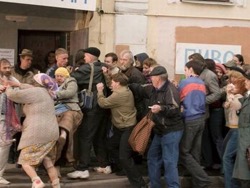
How the Nazi system was a broken person, as a person opposed to the system and the monstrously destructive psychological field, which strategies were used and how they were deformed . Politicaltool to public lectures on the psychology of personality, I looked through the excerpts from the book by psychoanalyst Bruno Bettel “Enlightened heart”. In it, he describes his experience of a prisoner of the concentration camps Dachau and Buchenwald, in which he was in 1938-1939, as well as the experiences of other people faced with the system of destruction of human dignity later, when the Nazis “opened up” to full power. Notes, extracts, and the result was this article.
I was interested in the psychological aspect of what was happening in the concentration camps. How the Nazi system was a broken person, as a person opposed to the system and the monstrously destructive psychological field, which strategies were used and how they were deformed . In the end, personality – these are our strategies to adapt to the existing around the world, and what he is, this world is largely (but not all) that determines who we are.
The Nazi system in 1938-1939 – the residence time of Bettelheim in Dachau and Buchenwald – was not aimed at total extermination, even though with lives then, too, was not considered. It has been focused on “education” of the slave power: ideal and obedient, not to think of anything but mercy from the owner, you do not mind to go. Accordingly, it was necessary from a resistant adult individual to make a frightened child, the power to infantilizing man, to seek his recourse to child or even to an animal, a live biomass without a personality, will and feelings. Biomass is easy to manage, she’s not sympathetic, it is easier to despise and it will obediently go to the slaughter. That is, it is convenient for the hosts.
Summarizing the main psychological strategies of suppressing and breaking of personality, described in the work of Bettelheim, I have identified and formulated several key strategies that, in General, is universal. And in different variations they were repeated and repeated at virtually all levels of society: from family to state. The Nazis have just compiled it all in a single concentrate of violence and terror. What these ways of transforming the individual into biomass?
Rule 1. Get the person to do meaningless work.
One of the favorite activities of the SS is to get people to do a completely pointless job, and the prisoners understood that it has no meaning. To carry stones from one place to another, dig holes with their bare hands when shovels lying near. Why? “Because I said so, you Jew!”.
(How is this different from “because Hey” or “your job is to perform and not think”?)
Rule 2. Enter mutually exclusive rules, breaches of which are inevitable.
This rule created an atmosphere of constant fear of being caught. People were forced to negotiate with the guards or “Capo” (the SS assistants among the prisoners), falling from them in complete dependence. Unfolded a large field for blackmail: the guards and Capo could draw attention to the violations and could and not to pay – in exchange for certain services.
(The absurdity and inconsistency of parental requirements or state laws – full analogue).
Rule 3. Enter collective responsibility.
Collective responsibility erodes personal – it’s a well known rule. But in terms sarkarda the cost of failure is too high, collective responsibility makes all members of the group of wardens in each other. The team becomes an unwitting ally of the SS and the camp administration.
Often, obeying every whim of the minute, SS gave another meaningless order. The pursuit of obedience has eaten into the psyche so much that there were always prisoners who have long complied with this order (even when the SS officer forgot about it five minutes later) and forced others to do so. So, one day, the warden ordered the prisoners to wash shoes inside and out with soap and water. Shoes became hard as a rock and rubbed his legs. The order will never be repeated. However, many have long been in the camp the prisoners went every day to wash inside his shoes, and cursed all those who did not, for negligence and dirt.
(The principle of group responsibility… When “all my fault”, or when a particular person can only see as representative of a stereotyped group and not as a mouthpiece of his own opinions).
These are three of the “provisional rules”. Percussion elements are the following three, crushing the already prepared the person in the biomass.
Rule 4. Get the people to believe that nothing ever depends on them. To do this: create an unpredictable environment in which it is impossible to make plans and get people to live according to the instruction, suppressing any initiative.
A group of Czech prisoners was destroyed. For some time they were identified as “noble” entitled to certain privileges, allowed to live in relative comfort without work and hardship. Then Chekov suddenly left to work in the quarry, where there were the worst working conditions and highest mortality rate, having cut down this diet. Then back in good housing and easy work, several months later – again in the quarry, etc. were any survivors. Full uncontrollability of his own life, the inability to predict, you encourage or punish, cut the ground from under his feet. The person simply does not have time to develop adaptation strategies, it disorganized completely.
“Human survival depends on its ability to retain some area of free behaviour, retain control over some important aspects of life, despite the conditions that seem unbearable… Even minor, symbolic ability to act or not to act, but his will to survive allowed me and like me”. (italics in quotes – quotes by B. Bettelheim).
The severe schedule is constantly customized people. If one or two minutes wait on the washing – ‘m late to the toilet. Delayed cleaning your bed (Dachau then still had beds) – no Breakfast meagre. Haste, fear of being late, not a second to think and stop… you customize the perfect guards: time and fear. Don’t you plan a day. You don’t choose to do. And you don’t know what will happen next. Punishment and the promotion went without any system. If at first, the prisoners thought that good work will save them from punishment, then came the understanding that there is no guarantee from sending to mine stone in the quarry (the deadliest lesson). And awarded just. It’s just a matter of the whim of the SS.
(Authoritarian parents and organisations is very beneficial this rule, because it provides the lack of activity and initiative on the part of recipients of messages like “nothing depends on you”, “what you achieved”, “thus was and always will be”).
Rule 5. ЗастWaffen_SSавь people to pretend that they don’t see or hear anything.
Bettelheim describes this situation. The SS officer beat man. Passes by the column of slaves, who, seeing the beating, turns their heads in unison toward and accelerated sharply, showing that “did not notice” what is happening. The SS officer, not looking up from his work, shouts “well done!”. Because the prisoners showed that it learned the rule “not to know and not to see what is not allowed”. And the prisoners intensifies the shame, the feeling of powerlessness and, at the same time, they unwittingly become accomplices of the SS, playing his game.
(In families with flourishing violence, the situation is not uncommon, when someone from the family sees and understands everything but pretends that nothing sees and does not know. For instance, a mother whose child is subjected to sexual abuse by father/stepfather… In totalitarian States the rule “all know, but pretend…” is the most important condition of their existence)
Rule 6. Get people to cross the last internal line.
“To avoid becoming a walking corpse and remain a man, let him humiliated and degraded, it was necessary to realize where that line is, because of which there is no return, the line cannot be derogated from under any circumstances, even if it is life threatening. Be aware that if you survived at the cost of conversion beyond that, we will continue the life that has lost all meaning”. 72488_0
Bettelheim leads this very visual, the story of the “last line”. Once the SS officer noticed two Jews who “hold out”. He made them lie down in a dirty ditch, called the prisoner-pole from the neighbouring brigade and ordered to bury fallen out of favor alive. Pole refused. The SS officer began to beat him, but the pole continued to refuse. Then the overseer ordered them to swap places, and the two were ordered to bury the pole. And they began to bury their comrade in misfortune, without the slightest hesitation. When the pole is almost buried, the SS officer ordered them to stop, to dig him back, and then again to lie down in a ditch. And again ordered the pole to bury them. This time he obeyed – or out of revenge, or thinking that SS might be spared at the last minute. But the warden is not pardoned: he pretotal boots land over the heads of the victims. After five minutes of them – one dead and the other dying – sent to the crematorium.
The result of the implementation of all the rules:
“Prisoners who have learned constantly vosemyu SS the idea that they have no hope, believing that they cannot affect their situation – such prisoners became, in a literal sense, walking corpses…”.
The process of turning such zombies was simple and clear. First, a person has ceased to act on their own: they would not have any internal source of motion, everything he did was determined by the pressure from the guards. They are automatically obeyed, without any selectivity. Then they stopped to raise the foot during walking, started out very typical, of course. Then they started to look only in front of him. And then comes death.
In zombies people turned when rejected every attempt to understand your own behavior and come to a state where they can make anything, everything that came from outside. “Those who survived realized what had not realized that they have last but maybe the most important human freedom: under any circumstances to choose their own attitude”. Where there is no private relationship, begins zombies.








